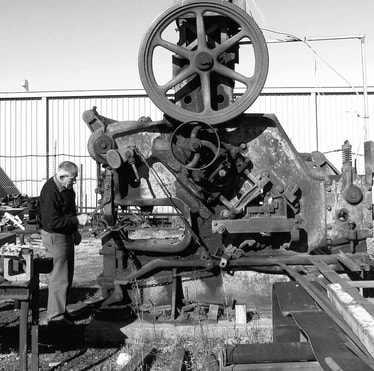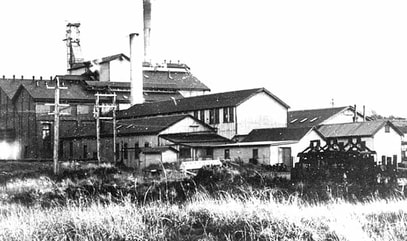 Danny Carr with “The Cropper”, one of the machines he and his crew salvaged from the mine workshop when it closed.
Danny Carr with “The Cropper”, one of the machines he and his crew salvaged from the mine workshop when it closed. COAL mining was classified as a vital industry during the Second World War – the miners didn’t have to go to fight – but a shortage of just about everything, including money, made operating the State Coal Mine ever more difficult.
The men in the mine workshops salvaged, reused, repaired and recycled every piece of metal available to repair the mine’s and power station’s ageing equipment to keep the coal moving and the power on.
These welders, blacksmiths, turners and fitters had been taught by some very good engineers as well as by practical tradesmen. They would patch and repair boiler tubes, skips, chains or any moving metal piece. They flattened shovels so the miners could work in narrow seams without skinning their knuckles.
 The Wonthaggi Power Station powered the town and mine
The Wonthaggi Power Station powered the town and mine from 1912 to 1966.
One of the surviving legends of the workshops is Danny Carr. Danny migrated from what was then Italy but is now Yugoslavia to Australia as a young child. His first experience of the mines came in 1937 when he was in Grade 4 and his mother told him to bike to 20 Shaft to see if his miner father was all right. His father was safe, but 13 of his workmates had died in a gas explosion, Wonthaggi’s worst ever mine disaster.
A born prankster, Danny was rated in the bottom third of the class at the start of Year 8. Deciding the rating system wasn’t fair, he determined to complete his Junior Technical Certificate. By the end of the year he was dux of his class.
Convinced that he had had enough schooling, he went looking for an apprenticeship in turning and fitting, despite the best efforts of his parents, teachers and the mine manager, Mr McLeish, to persuade him to return to school. Mr McLeish finally relented, realising he could lose a potential star recruit if he didn’t take Danny on.
Danny began work as an apprentice in the mine workshops in 1942. From the start, he loved working there. He was absorbed and amazed by the skill of his masters and the mixture of nationalities, cultures, ideas and skills of the tradesmen.
The whole district benefited from the problem-solving skills developed by these men in times of shortage. When the mines closed in 1968, Danny and five of his co-workers used a Fergie tractor to tow away five machines from the workshops that would otherwise have ended up as scrap metal, as so much from the defunct mine did. The machinery, including a lathe and giant cutter, was used to establish their own business – Carrs Engineering, now MWC Engineering – in McKenzie Street.
Carrs workshop was never a model of tidiness but the engineering skills and inventiveness shown by the workers there became legendary throughout the district and, indeed, throughout Gippsland.
When they needed a special part or piece of equipment, everyone from the fishermen of Western Port through to the managers of factories, quarries and briquette works turned to Danny and his crew to weave their mechanical magic.
At the Wonthaggi Power Station, Danny had machined the turbine bearings – which ran at 5000 revs per minute – to an accuracy of less than one-thousandth of an inch. He brought the same skill to replacing a rare part for a local farmer’s tractor. He built drum reels for shark nets and replaced propellor shafts on fishing boats.
From a 230mm square block of steel, he could make a 330mm diameter pinion for a winch or a complete new bearing housing for a 100mm shaft.
“He was no mug, our Danny,” says Vic Benetti, an old mate since technical school days.
“I’ve never seen him make a blunder. He always knew the easiest way to do a job.”
Ralf Piasente, the production manager at the Archies Creek Butter Factory, describes Danny as an “unsung hero”. “Everything he and his gang did was done to perfection,” Ralf recalls.
He says Danny designed and built 25-ton milk powder bins for the factory, as well as conveyors and milk silos. “He and his gang were totally professional. They would build a broken overseas part overnight if you needed it.”
The size of the job was never an issue. Whether they were seeking a part for a skateboard, a large church crucifix or a hay baler, clients were all treated with due respect. Anyone who showed himself willing and capable was likely to be invited to help in the task.
Ralf says Danny’s motivation was never monetary. “He could have been a very rich man, but it wasn’t about the money. His loyalty was to the community.”
Danny now lives a simple retirement in a small neat house almost across the road from his old workshop. But on rainy winter afternoons when there is no chance of catching a fish, he often heads down to the shed for another turn. There you’re likely to find him behind a cutting machine set at an odd angle, a page full of numbers and calculations beside him, working out how to solve a problem.
This essay was first published in The Current in 2006. Now in his 90s, Danny Carr is still a regular visitor to the workshops at the State Coal Mine Heritage Area.